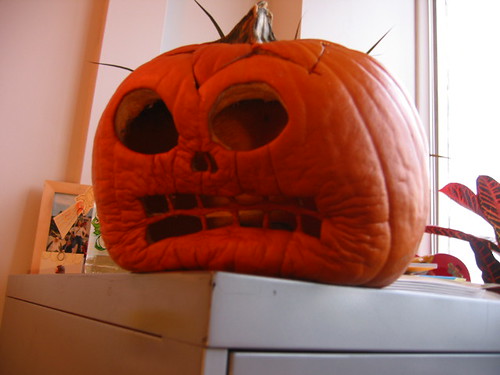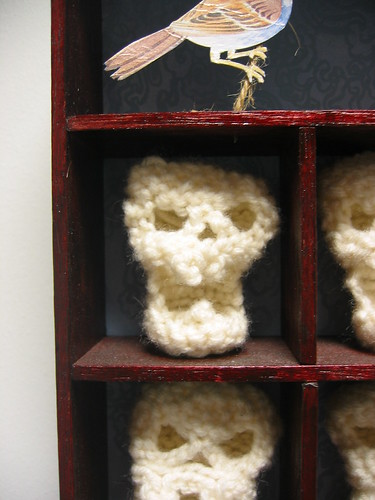There are a handful of references to ghosts and contemporaneous ghost stories scattered throughout Boswell's Life, though most of them involve Johnson dismissing an account as lacking sufficient evidence. Skepticism on this front really does seem to have been his mode: though it is barely mentioned in Boswell's book, Johnson was part of the commission that determined that the famous Cock Lane Ghost was a fraud, and he played a role in publicizing that fact afterwards.

{Photos by rocketlass.}
There is one ghost story in Boswell's book, however, that is both more extended and treated with more credulity, and thus seems worth sharing in this ghostly month. Boswell, seeing Hogarth's engraving Modern Midnight Conversation, asks Johnson what he knows of Parson Ford, "who makes a conspicuous figure in the riotous groupe," then mentions that he thought he'd heard that the Parson's ghost had once been spotted. "Sir, it was believed," replies Johnson. He continues:
A waiter at the Hummums, in which house Ford died, had been absent for some time, and returned, not knowing that Ford was dead. Going down to the cellar, according to the story, he met him; going down again, he met him a second time. When he came up, he asked some of the people of the house what Ford could be doing there. They told him Ford was dead. The waiter took a fever, in which he lay for some time. When he recovered, he said he had a message to deliver to some women from Ford; but he was not to tell what, or to whom. He walked out; he was followed; but somewhere about St. Paul's they lost him. He came back, and said he had delivered the message, and the women exclaimed, "Then we are all undone!"I'll admit to not being entirely sure how to interpret the women's reaction. Are they assuming that the delivery of a secret message to a secret--female--recipient means that Parson Ford had a hitherto unknown illicit life, and thus they are "undone" in a moral sense? Or are they simply reacting to seeming proof of supernatural forces at work?
Johnson, obviously intrigued by this story, goes into the evidence for its veracity:
Dr. Pellet, who was not a credulous man, inquired into the truth of this story, and, he said, the evidence was irresistible. My wife went to the Hummums; (it is a place where people get themselves cupped.) I believe she went with intention to hear about this story of Ford. At first they were unwilling to tell her; but, after they had talked to her, she came away satisfied that it was true. To be sure the man had a fever; and this vision may have been the beginning of it. But if the message to the women, and their behaviour upon it, were true as related, there was something supernatural. That rests upon his word, and there it remains.Is that Johnson's wife, Tetty, out investigating? It certainly seems like it--and the spunk the story suggests makes a nice counterpoint to the lingering sense we still get of Tetty as an unpleasant invalid.
So chalk one up for the ghosts, sayeth Dr. Johnson. Oh, what I'd give for a whole book of Johnson's analyses of tales of hauntings--imagine teaming him up with John Aubrey's (too credulous) ear for rumor!

I'll close with a line from a story found in Otto Penzler's great anthology The Big Book of Ghost Stories, Joseph Shearing's "They Found My Grave." The story itself has nothing to do with Dr. Johnson--it's about seances and table-turnings in the late Victorian era--but this description of the most prominent of the spirits conjured at the sittings struck me as quite Johnsonian:
"Oh," smiled Mr. Lemoine, rising to indicate that the sitting was at an end. "He is a common type, a snob. When he was alive he boasted about his distinctions, visits to court, and so on; now he is dead he boasts of having seen God, being in Heaven, and the marvels of his grave."A merciless analysis of character, a hint of ironic amusement, an eye for the power of vanity--doesn't that sound like the good Doctor?

To heck with zombies and vampires, give me a good ghost story any day.
ReplyDelete